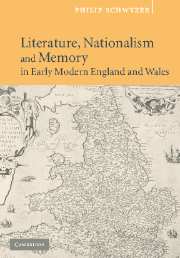Book contents
- Frontmatter
- Contents
- Acknowledgments
- Note on the text
- Introduction: remembering Britain
- 1 Spenser's spark: British blood and British nationalism in the Tudor era
- 2 Bale's books and Aske's abbeys: nostalgia and the aesthetics of nationhood
- 3 “Awake, lovely Wales”: national identity and cultural memory
- 4 Ghosts of a nation: A Mirror For Magistrates and the poetry of spectral complaint
- 5 “I am Welsh, you know”: the nation in Henry V
- 6 “Is this the promised end?” James I, King Lear, and the strange death of Tudor Britain
- Bibliography
- Index
3 - “Awake, lovely Wales”: national identity and cultural memory
Published online by Cambridge University Press: 07 December 2009
- Frontmatter
- Contents
- Acknowledgments
- Note on the text
- Introduction: remembering Britain
- 1 Spenser's spark: British blood and British nationalism in the Tudor era
- 2 Bale's books and Aske's abbeys: nostalgia and the aesthetics of nationhood
- 3 “Awake, lovely Wales”: national identity and cultural memory
- 4 Ghosts of a nation: A Mirror For Magistrates and the poetry of spectral complaint
- 5 “I am Welsh, you know”: the nation in Henry V
- 6 “Is this the promised end?” James I, King Lear, and the strange death of Tudor Britain
- Bibliography
- Index
Summary
In February of 1574, the young Philip Sidney, at rest in Padua in the course of his continental tour, received a letter from his mentor, Hubert Languet. Having dispensed the usual stiff dose of moral and scholarly advice, the Huguenot intellectual adopted a more playful tone to report his reading of a certain author who
would think he had received great injury at my hands if I should call him English, because he again and again declares that he is Welsh, not English. His name is Humphrey Lhuyd, and he is, if not really learned, at any rate well read, though he occasionally makes judgments which seem to lack common sense… You are fortunate that your ancestors came from France, for he says that the Saxons from whom the English descend were nothing but pirates and robbers.
The book Languet had been reading was Humphrey Llwyd's recently published Commentarioli Brittanicae descriptionis fragmentum (Cologne, 1572; translated into English by Thomas Twyne in 1573 as The Breviary of Britain). The unfinished final work of the esteemed Welsh humanist, geographer, and antiquarian, Llwyd's survey of Britain had been undertaken at the request of the atlas-maker, Abraham Ortelius. The Fragmentum included a robust defense of Geoffrey of Monmouth against the skepticism of two foreign historians, the Italian Polydore Vergil and the Scot Hector Boece. It was one aspect of this defense which particularly incensed Languet.
- Type
- Chapter
- Information
- Publisher: Cambridge University PressPrint publication year: 2004



